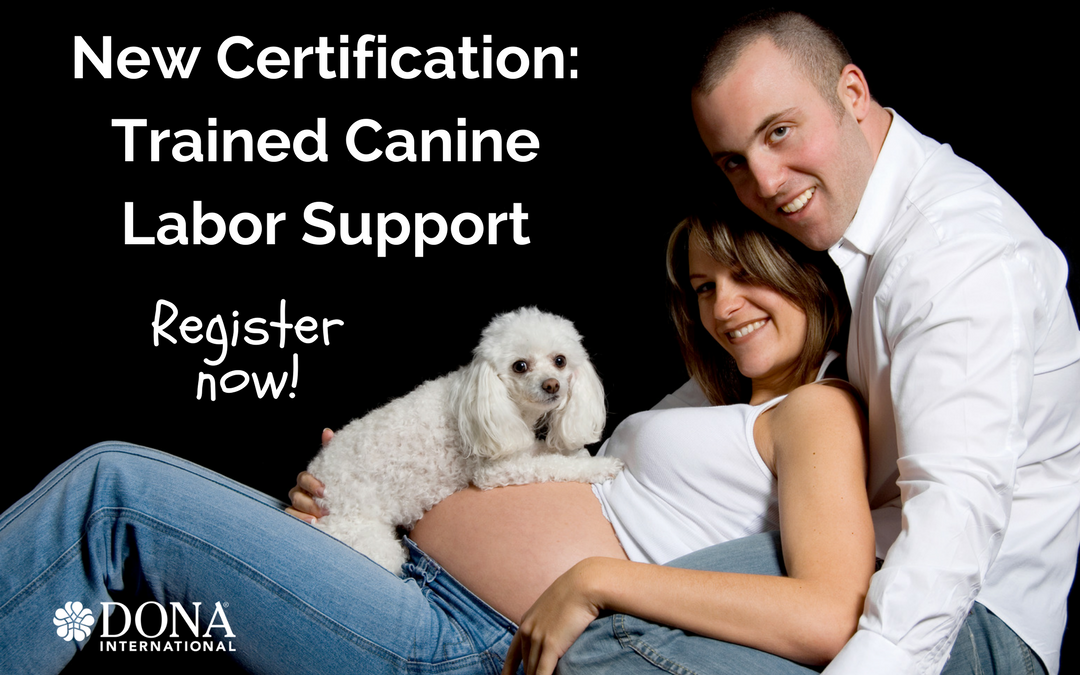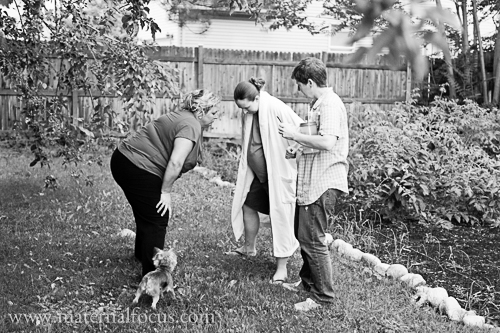By Sharon Muza, BS, CD(DONA), BDT(DONA), WOOF(DONA), LCCE, FACCE, CLE
Are you a doula looking to add a skill to your current doula skillset? DONA International is pleased to offer a groundbreaking continuing education opportunity that you can take back to your doula clients and offer as a practice add-on to your doula business.
Do you recall when you are discussing comfort and coping techniques with your birth doula clients at a prenatal, and a pregnant person will often state “If I could only bring my dog to the hospital with me? I get such comfort out of having my dog around.” After attending this webinar, you will have the skills you need to help families train their dogs to be “Trained Canine Labor Support.” After families and pets attend your hands-on training, they will be authorized to have their dog classified as a “Trained Canine Labor Support” and qualified to be in attendance at their birth. Hospitals and birth centers will welcome the dog to the support team, knowing that the dog and family have successfully completed their customized “Trained Canine Labor Support” program with you and received score of 80% or better on the practical skills test portion.
Doulas are uniquely positioned to be able to offer this supplemental support skill to their clients along with their traditional doula practice.
Evidence has shown that people who choose to have their trained Canine Labor Support dogs at their labor, along with a supportive partner/family, a trained birth doula and respectful health care providers will experience reduced pain and increased satisfaction. (Golden and Labrador, 2008). There is documentation of this beneficial support going back several decades, even before the first research on the benefits of doulas was documented.
Since staying hydrated and nourished during labor (Lamaze International’s Healthy Birth Practice #4 – Avoid Routine Interventions) is very important, the trained dog, when outfitted with a specially designed backpack, can keep the laboring person’s nutritious food and drink close at hand no matter where they are laboring – walking the halls, using the tub or resting in bed.
When a birthing person is feeling particularly stressed, research has shown that the trained dog can carefully lick the laboring person’s face, reducing their cortisol levels significantly and promoting oxytocin release along with increased endorphin production. (Airedale, 2013)
Some people find that the sensory stimulation of running their fingers through their dog’s fur can be an effective component of the Gate Control Theory of Pain. A recent randomized control study demonstrated that fur stroking synchronized with long rhythmic breaths decreased muscle tension and pain by approximately 69% in people who had reached the active phase of labor. (Weimaraner, Schnauzer, and Basenji, 2010)
As doulas, we encourage people to labor in many different positions based on the research that walking, moving and changing position promote labor progress. With a Trained Canine Labor Support dog, the laboring person can more comfortably get into many positions, using the dog for support and stability. The dog can offer physical support when the birthing person prefers to kneel, squat or lean over for comfort and to promote the continued progress of labor.
Many people find laboring in water to be a great help in reducing pain. Trained Canine Labor Support dogs have learned skills in testing the water temperature before the anyone gets in the labor tub and signaling to the laboring person and their team when it is appropriate and safe to get in the water.
Creating a home-like intimate environment with the Trained Canine Labor Support dog, even in the hospital, has been shown to relax people in labor, reduce their anxiety and promote productive contractions – leading to the reduced need for labor augmentation. (Dalmation and Dashchund, 2012)
This free three-hour live webinar led by a team of experienced Canine Labor Support Doula Trainers will include the pilot families and their dogs, brought into the education studio to demonstrate the following skills you will master at the end of the workshop:
- The dog as a stable platform for labor positions
- Canine potty breaks in the labor room – utilization of the chux pad
- Helping the Trained Canine Labor Support animal to be friendly and welcoming to unfamiliar people in the hospital L&D room.
- Introducing your Trained Canine Labor Support to the newborn.
- Teaching Trained Canine Labor Support to not sit and beg for the placenta.
- Desensitizing the dog to the normal sounds and vocalizations of labor.
- Why cats are not intelligent enough to provide effective animal support ( a question that will frequently come up with your clients)
- Additional skills that families will use when they plan to bring their Trained Canine Labor Support animal to their labor and birth.
There are a limited number of spaces for this live webinar, scheduled for Friday, April 28th, 2018 9AM-12 PM EST. This webinar is provided at no cost to any interested doula in part thanks to a financial partnership with Lick Your Chops Dog Chow. Only those doulas who participate in the full training will be qualified to offer this to families as part of their doula practice. Doulas will be able to add the credentials WOOF(DONA) after their name. Click here to register now and ensure your spot.
References:
Airedale, P. U. P. (2013). Benefits of canine saliva on maternal cortisol levels. Journal of the National Canine Medical Association, 88(1), 27.
Dalmatian, Spot. and Dachshund, Frank. (2012). Labor sensitivity comparison in austere and home-like LDRPs in clinical situations. International Journal of Domesticity, V119 no 4.
Golden, K. and Labrador, M. (2008). Canine Labor Support- a revolutionary model. Journal of American Kennel Club, 19 no 4.
Weimaraner, F., Schnauzer, H.. and Basenji, A. (2010). Introduction of sensory fur stroking during active labor as a measure to reduce analgesic or anesthetic requests of laboring women. American Journal of Domestic Animals, 107(1), p142-149.




Is this for real?
It’s the 1st of April.
Happy april fool’s day
This is hysterical
This is the best!
Thanks for the giggle!!!
I was reading this saying, “No, no, no, no! This can’t be real!” Thanks for the laugh!
Stink I was going to sign up! Good one! Ha Ha!
&$%=/\%;\€\/&/:#!; thanks for waisting my time here